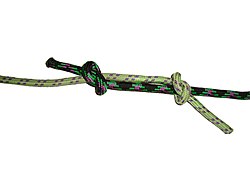Difference between revisions of "Translations:AY Honors/Kites/Answer Key/78/en"
From Pathfinder Wiki
(Importing a new version from external source) |
(Importing a new version from external source) |
||
| (2 intermediate revisions by the same user not shown) | |||
| Line 1: | Line 1: | ||
</noinclude> | </noinclude> | ||
| − | {{: | + | {{:AY Honors/Knot/Fisherman's_bend}} |
| − | Note:- This is a quick and easy knot with which to fasten two ends of line. Unfortunately the weakest part is now the knot which is approximately 45 percent of the line strength. A better knot which gives a finished strength of approximately 60 percent of the line strength is the 'riggers | + | Note:- This is a quick and easy knot with which to fasten two ends of line. Unfortunately the weakest part is now the knot which is approximately 45 percent of the line strength. A better knot which gives a finished strength of approximately 60 percent of the line strength is the 'riggers bend'. {{deadlink|link=http://www.scoutingsources.org.uk/downloads/knots_hunters_bend.pdf}} |
Latest revision as of 16:06, 21 September 2021
| Fisherman's knot |
|---|
|
Use: The Fisherman's knot is a specialized bend. It consists of two overhand knots wrapped around each other. It works well for joining thin, stiff, or slippery lines.
It requires little dexterity to tie, so is often used in stubborn materials. When tightened, it becomes fairly compact, and the free ends can be cropped very close to the knot. These qualities make it very useful for fishing line--it is less likely to jam a fishing rod than many other bends, and is easier to tie with cold, wet hands.
How to tie:
|
Note:- This is a quick and easy knot with which to fasten two ends of line. Unfortunately the weakest part is now the knot which is approximately 45 percent of the line strength. A better knot which gives a finished strength of approximately 60 percent of the line strength is the 'riggers bend'.

